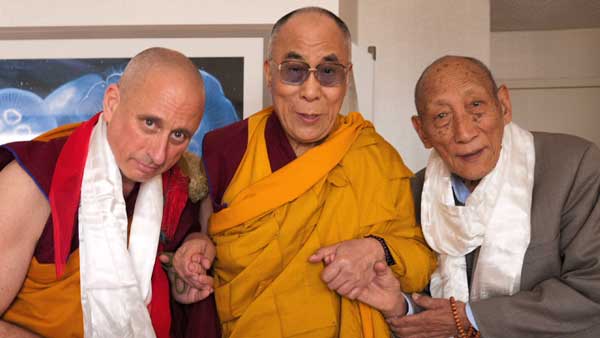NEW YORK (RNS) The Dalai Lama has given Nicholas Vreeland, director of The Tibet Center in New York, a daunting new assignment. On July 6, Vreeland will be enthroned as the new abbot of Rato Monastery in southern India, one of the most important monasteries in Tibetan Buddhism. He will be the first Westerner to hold such a position.
In making the appointment, the Dalai Lama told Vreeland, “Your special duty (is) to bridge Tibetan tradition and (the) Western world.”
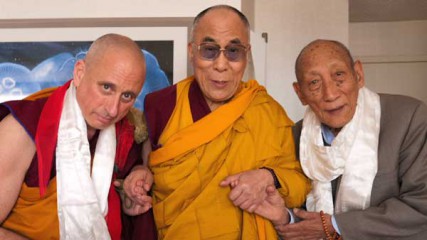
From left, Nicholas Vreeland, the Dalai Lama and Khyongla Rato Rinpoche. On July 6, Vreeland will be enthroned as the new abbot of Rato Monastery in southern India, one of the most important monasteries in Tibetan Buddhism. He will be the first Westerner to hold such a position.
“His Holiness wishes to bring Western ideas into the Tibetan Buddhist monastic system, and that comes from his recognition that it is essential … that there be new air brought into these institutions,” Vreeland told the PBS program “Religion & Ethics NewsWeekly.”
For many observers, the choice of an American for the role may be a surprising one, and perhaps even more surprising given the background of this particular American.
Vreeland had a privileged upbringing — the son of a U.S. diplomat and the grandson of Diana Vreeland, the legendary editor of Vogue magazine during the 1960s. When he first encountered Tibetan Buddhism in his 20s, he was working as a photographer in some of the industry's top studios.
“What is it about Tibetan Buddhism that interested me? I think that it’s this very linear, very carefully organized, path to enlightenment that I liked,” Vreeland said.
Vreeland sees a linear progression in his own path into Buddhism. He was born in Switzerland and also lived in Germany and Morocco before his family returned to New York. They were Episcopalians and sent 13-year-old Nicky to a boys’ boarding school in Massachusetts. He was miserable there, until he discovered photography.
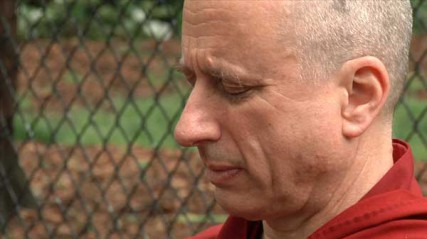
The Dalai Lama has given Nicholas Vreeland (pictured here), director of The Tibet Center in New York, a daunting new assignment. On July 6, Vreeland will be enthroned as the new abbot of Rato Monastery in southern India, one of the most important monasteries in Tibetan Buddhism. He will be the first Westerner to hold such a position.
“I don’t know what it was about it that caught me. I really don’t know, but it caught me,” he said.
Vreeland had a good relationship with his famous grandmother. “I went to NYU to study film, and at that time initially lived with her and became very close. She was a wonderful, enthusiastic friend,” he said.
She opened the door for him to work with prominent photographers Irving Penn and Richard Avedon. In 1977, Avedon’s son John introduced Vreeland to Khyongla Rato Rinpoche, founder of The Tibet Center. Under Rinpoche’s supervision, Vreeland began learning about Tibetan Buddhism.
In 1979, he went to work on a photography assignment in India. Because of his growing interest in Tibetan Buddhism, he included a stop in Dharamsala, the headquarters-in-exile of the Dalai Lama. Vreeland received permission to photograph the Tibetan leader, and the two men chatted as Vreeland packed up his equipment.
“I had been so moved by the way in which the Tibetan people had helped me … during my time in Dharamsala, and I asked His Holiness what I could do in return. And he said, “Study,” Vreeland recalled.
Vreeland took that advice to heart, and with the help of his teacher, explored the Tibetan Buddhist concept that logic can lead to developing compassion and attaining enlightenment.
In 1985, Vreeland decided to become a Buddhist monk. His grandmother was not happy about it.
“She was not a big proponent of following a spiritual life,” he said, adding that she eventually came to accept his decision.
Vreeland pursued his monastic studies at Rato monastery, the monastery he will now lead. Rato was established in Tibet in the late 14th century to preserve Buddhist teachings on logic and debate. After the Dalai Lama fled China in 1959, Rato was re-established in India.
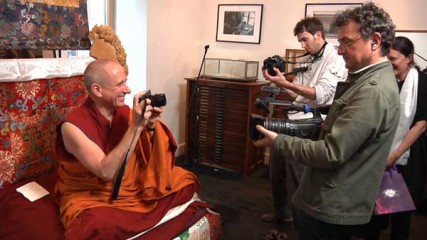
The Dalai Lama has given Nicholas Vreeland (pictured here far left), director of The Tibet Center in New York, a daunting new assignment. On July 6, Vreeland will be enthroned as the new abbot of Rato Monastery in southern India, one of the most important monasteries in Tibetan Buddhism. He will be the first Westerner to hold such a position.
When Vreeland arrived in 1985, there were 27 monks. Today, there are about 100 between the ages of 6 and 90. The monastery undertook a massive construction project, which was largely funded through the sale of Vreeland’s photographs. He raised $400,000 with a special series of photos documenting life in and around the monastery.
As abbot of Rato, Vreeland will have administrative and spiritual responsibility for the monastery and its monks. He’ll also interact with abbots of the other Tibetan monasteries — and that's where the Dalai Lama has instructed him to help incorporate more Western ideas.
“These institutions, if they aren’t contemporary, won’t have any relevance. Now, of course one has to be very careful. If you go too far, you dilute what they do possess and you’ve lost everything,” Vreeland said.
Vreeland will divide his time between India and New York, where he’ll continue as director of The Tibet Center, which helps promote Tibetan Buddhism in the West.
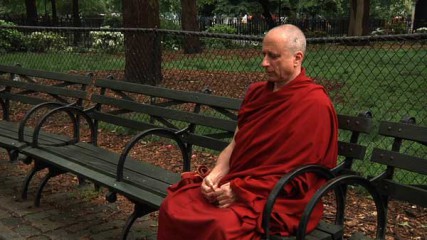
The Dalai Lama has given Nicholas Vreeland (pictured here), director of The Tibet Center in New York, a daunting new assignment. On July 6, Vreeland will be enthroned as the new abbot of Rato Monastery in southern India, one of the most important monasteries in Tibetan Buddhism. He will be the first Westerner to hold such a position.
He admits he is not yet sure how he will be that bridge between East and West: “I am a human being, I’m a Buddhist monk, I am a Westerner, and how I will bring what I believe in? I think it’s by just living my life.”
(A version of this story was first broadcast on the PBS program “Religion & Ethics NewsWeekly.”)
